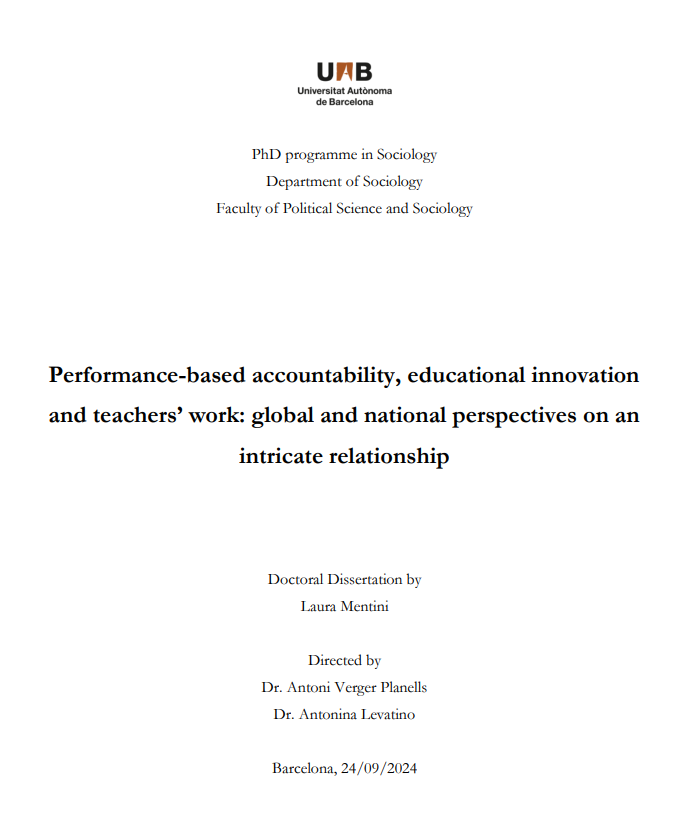Defensa de tesi de Laura Mentini
Performance-based accountability, educational innovation and teachers’ work: global and national perspectives on an intricate relationship

Performance-based accountability (PBA) policies have become increasingly prevalent in the education sector, aiming to improve educational outcomes by holding schools, teachers, and administrators accountable for their performance. Concurrently, there has been a growing emphasis on fostering innovation within educational systems to meet the evolving needs of learners and societies in the 21st century. The intersection between PBA and innovation policies presents a contradictory and multifaceted landscape, shaping the policy ideas of educational stakeholders and influencing enactment dynamics within schools in very different ways.
This doctoral dissertation explores the intricate relationship between PBA and innovation policies in the education sector, and the role of teachers’ wellbeing therein. Through an in-depth analysis of policy discourses, school enactment strategies, and teacher emotional responses, the dissertation aims to uncover the interactions and implications of these two mandates, examining both the academic literature at an international level as well as the policy frameworks and school-level attitudes and practices in the specific Italian context.
The dissertation employs a qualitative and multi-method approach combining different research instruments and analytical approaches, each tailored to a specific research question within three distinct sub-studies. This includes (a) a scoping review of the literature (b) semi-structured interviews with key educational stakeholders and decision-makers and document analysis (c) semi-structured interviews with school actors. Methodologically, the research is guided by a multi-sited case study framework to examine the deployment of policies across different policy levels and a realist evaluation approach that helps uncover the mechanisms driving policy implementation and its outcomes in different contexts.
The findings of the research highlight the professional and emotional implications of PBA on teachers, highlighting that PBA can reinforce socially desirable emotions and self-regulation and lead to both positive as well as negative feelings. Findings also underscore emotional consequences of PBA that discourage teachers from engaging in innovative pedagogical practices. The review emphasizes that factors such as school culture, student composition, principal leadership, and individual characteristics can influence how teachers emotionally experience PBA.
The findings related to the policy process underpinning the Italian National Evaluation System (SNV), highlight the assumptions, rationales, and tensions of PBA and autonomy to drive educational innovation in Italy. The research also highlights the fragmented and irregular policy adoption of PBA reforms in the country, the interplay of various interest groups, and the heterogeneous meanings and justifications given to PBA and innovation by key stakeholders in the country.
Empirical evidence from Italian schools finally illustrates the varied range of understandings, filtering and adaptations of PBA and innovation mandates by school actors. PBA policies, while intended to promote self-evaluation and improvement, can in some contexts also hinder innovation in schools due to the performative pressure they generate. The study finally identifies key factors such as actors’ sense-making, schools’ socio-economic status, organizational culture, and material conditions that mediate the enactment of PBA instruments, contributing to a deeper understanding of how institutional, organizational and individual factors interact to shape educational practices in the context of PBA reforms.
Date: 04/12/2024
Hour: 16 h
Place: Sala Graus (Fac. Ciències Polítiques i Sociologia)